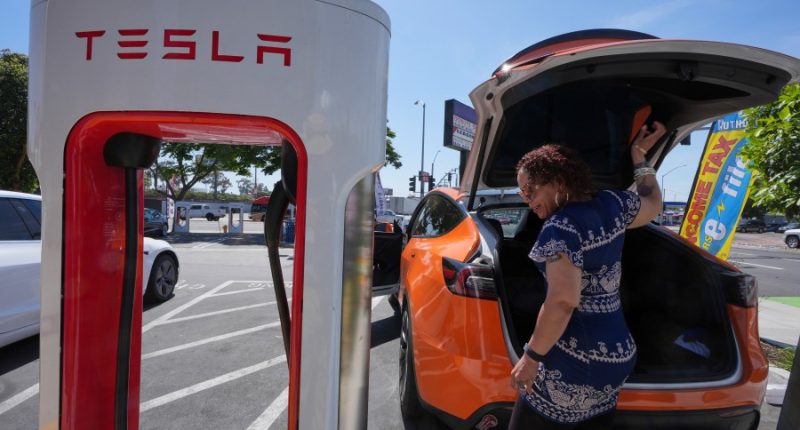Share this @internewscast.com

DETROIT (AP) — On Friday, Transportation Secretary Sean Duffy stated that the Biden-era fuel economy regulations for gasoline-powered vehicles were not lawful. He took steps to overturn these rules, which could lead to a potential overhaul of the current standards.
This decision, paired with provisions in the upcoming Senate budget bill to remove penalties for surpassing fuel efficiency standards, suggests that automakers may face less regulatory pressure to cut pollution. This could ultimately decelerate the nation’s shift towards electric vehicles.
These actions are in line with the Trump administration’s continuous efforts to reduce federal backing for electric vehicles (EVs). President Donald Trump has vowed to terminate what he inaccurately referred to as an EV “mandate,” misunderstanding former President Joe Biden’s goal for electric vehicles to make up half of all new car sales by 2030. Unlike gas vehicles, EVs do not rely on gasoline and do not emit greenhouse gases that contribute to global warming.
No federal policy has required auto companies to sell — or car buyers to purchase — EVs, although California and other states have imposed rules requiring that all new passenger vehicles sold in the state to be zero-emission by 2035.
When he was in office, Biden imposed increasingly stringent emissions standards for cars and trucks. He included use of EVs in calculating the rules — an inclusion the Trump administration and the auto industry have argued was illegal and raised the bar too high for automakers to meet.
The Transportation Department’s memorandum Friday said the previous administration “ignored statutory requirements” that barred consideration of EVs when setting standards.
“We are making vehicles more affordable and easier to manufacture in the United States,” Duffy said.
The revised rule does not itself change existing standards, but it empowers the National Highway Traffic Safety Administration to make adjustments in coming months. Duffy put pressure on the federal agency earlier this year to reverse the fuel economy rules as soon as possible.
Under the Biden administration, automakers were required to average about 50 miles (81 kilometers) per gallon of gas by 2031 — up from about 39 miles (63 kilometers) per gallon for light-duty vehicles today — in an effort to save almost 70 billion gallons (265 billion liters) of gasoline through 2050.
The rules, finalized in 2024, increased fuel economy 2% per year for passenger cars in every model year from 2027 to 2031, and 2% each year for SUVs and other light trucks from 2029 to 2031.
Mileage rules — in place since the 1970s energy crisis — work alongside the EPA limits on vehicle greenhouse gas emissions. Transportation accounts for the largest source of the nation’s planet-warming emissions, and cars and trucks make up more than half of those.
In recent years, automakers have been manufacturing gasoline-fueled cars that are more efficient and get higher mileage.
The Alliance for Automotive Innovation, which represents automakers, called Duffy’s announcement “a positive development” that adds “important clarity” to federal mileage rules.
The Biden-era standards “were ‘improperly predicated’ on alternative fuel vehicles,” said John Bozzella, the group’s president and CEO.
But Katherine Garcia, director of the Sierra Club’s Clean Transportation for All program, said the Transportation Department’s action will increase costs for Americans and increase pollution.
“Making our vehicles less fuel-efficient hurts families by forcing them to pay more at the pump,” she said. “It will lead to fewer clean-vehicle options for consumers, squeeze our wallets, endanger our health and increase climate pollution.”
Meanwhile, Republicans on the Senate Commerce Committee added proposed language to the pending budget bill Thursday that would remove fines penalizing automakers that don’t meet fuel economy standards with their gas-powered vehicles.
Automakers can buy credits under a trading program if they don’t meet the standards. Manufacturers whose vehicles exceed the standards earn credits that they can sell to other carmakers.
The memo and bill text landed this week as Tesla owner Elon Musk and Trump engage in a public spat online, with Trump suggesting that Musk “only developed a problem” with his budget bill because it rolls back tax credits for EVs. Musk disputes that.
___
Daly reported from Washington.
___
Read more of AP’s climate coverage at
___
The Associated Press’ climate and environmental coverage receives financial support from multiple private foundations. AP is solely responsible for all content. Find AP’s standards for working with philanthropies, a list of supporters and funded coverage areas at AP.org.
















